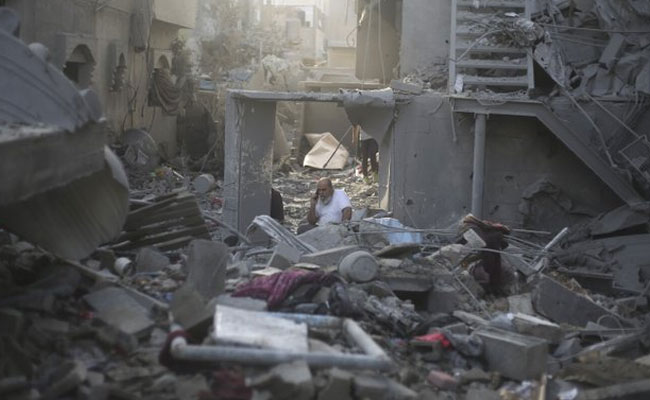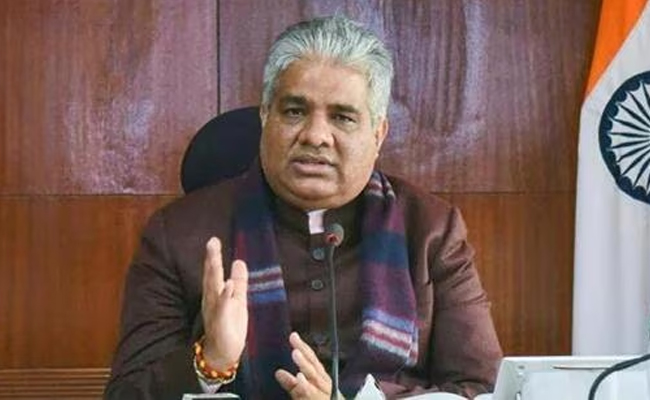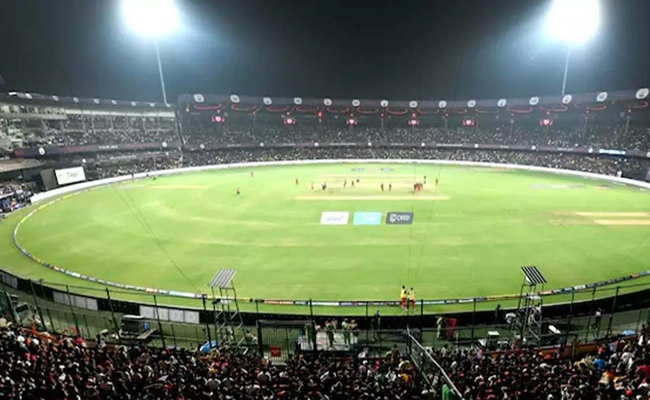Rafah (Gaza Strip) (AP): Israeli warplanes struck targets across Gaza overnight and into Sunday, as well as two airports in Syria and a mosque in the occupied West Bank allegedly used by militants, as the 2-week-old war with Hamas threatened to spiral into a broader conflict.
Israel has traded fire with Lebanon's Hezbollah militant group on a near-daily basis since the war began, and tensions are soaring in the Israeli-occupied West Bank, where Israeli forces have battled militants in refugee camps and carried out two airstrikes in recent days.
Israeli Prime Minister Benjamin Netanyahu told troops in northern Israel that if Hezbollah launches a war against Israel, "it will make the mistake of its life. We will cripple it with a force it cannot even imagine and the consequences for it and the Lebanese state will be devastating".
For days, Israel has seemed to be on the verge of launching a ground offensive in Gaza as part of its response to Hamas' deadly October 7 rampage. Tanks and tens of thousands of troops have massed at the border, and Israeli leaders have spoken of an undefined next stage in operations.
Israel's military spokesman, Rear Adm. Daniel Hagari, said the country had increased airstrikes across Gaza to hit targets that would reduce the risk to troops in the next stage of the war.
Hamas said it fought with Israeli forces near Khan Younis in southern Gaza and destroyed a tank and two bulldozers. The Israeli military said it had no information about the claim.
On Saturday, 20 trucks entered Gaza in the first aid shipment into the territory since Israel imposed a complete siege two weeks ago.
Egypt's state-run media reported 17 more trucks crossing into Gaza on Sunday, but the United Nations said none had crossed.
"Until now, there is no convoy," said Juliette Touma, spokeswoman for the UN agency for Palestinian refugees.
Associated Press journalists saw seven fuel trucks head into Gaza, but Touma and the Israeli military said those trucks were taking fuel that had been stored on the Gaza side of the crossing deeper into the territory, and that no fuel had entered from Egypt.
In a sign of how precarious any movement of aid remains, two Egyptian officials said Israeli shells hit close to the Egyptian side of the crossing on Sunday, wounding nine Egyptian border guards. The officials spoke on condition of anonymity because they were not authorised to brief the media.
The Israeli military said a tank had accidentally fired and hit an Egyptian post, and the incident was being investigated. It apologised for the incident.
Relief workers said far more aid was needed to address the spiralling humanitarian crisis in Gaza, where half the territory's 2.3 million people have fled their homes. The UN humanitarian agency, known as OCHA, said Saturday's convoy carried about 4 per cent of an average day's imports before the war and "a fraction of what is needed after 13 days of complete siege".
The Israeli military said the humanitarian situation was "under control", even as OCHA called for 100 trucks a day to enter.
Israel repeated its calls for people to leave northern Gaza, including by dropping leaflets from the air. It says an estimated 700,000 have already fled, but hundreds of thousands remain. That would raise the risk of mass civilian casualties in any ground offensive.
Israeli military officials say Hamas' infrastructure and underground tunnel system are concentrated in Gaza City, in the north, and that the next stage of the offensive will include unprecedented force there.
Israel says it wants to crush Hamas, but officials have also spoken of carving out a possible buffer zone to keep Palestinians from approaching the border.
Hospitals packed with patients and displaced people are running low on medical supplies and fuel for generators, forcing doctors to perform surgeries with sewing needles, using vinegar as disinfectant, and without anaesthesia.
The World Health Organisation says at least 130 premature babies are at "grave risk" because of a shortage of generator fuel. It said seven hospitals in northern Gaza have been forced to shut down due to damage from strikes, lack of power and supplies, or Israeli evacuation orders.
Shortages in critical supplies, including ventilators, are forcing doctors to ration treatment, said Dr. Mohammed Qandeel, who works in Khan Younis' Nasser Hospital. Dozens of patients continue to arrive and are treated in crowded, darkened corridors, as hospitals preserve electricity for intensive care units.
"It's heartbreaking," Qandeel told the AP. "Every day, if we receive 10 severely injured patients we have to manage with maybe three or five ICU beds available."
Palestinians sheltering in UN-run schools and tent camps are running low on food and drinking dirty water. A power blackout has crippled water and sanitation systems. OCHA said cases of chickenpox, scabies and diarrhea are on the rise because of the lack of clean water.
Heavy airstrikes were reported across Gaza, including in the southern part of the coastal strip, where Israel has told civilians to seek refuge. At the Al-Aqsa hospital in Deir al-Balah, south of the evacuation line, several bodies wrapped in white shrouds were lined up outside on the ground.
Khalil al-Degran, a hospital official, said more than 90 bodies had been brought in since early Sunday, as the sound of nearby bombing echoed behind him. He said 180 wounded people had arrived, mostly children, women and the elderly who had been displaced from other areas.
Airstrikes also smashed through the marketplace in the Nuseirat refugee camp. Witnesses said at least a dozen people were killed.
Israel's military has said it is striking Hamas fighters and installations, but does not target civilians. Palestinian militants have fired over 7,000 rockets at Israel, according to the military, and Hamas says it targeted Tel Aviv early on Sunday.
More than 1,400 people in Israel have been killed mostly civilians slain during the initial Hamas attack. At least 212 people were captured and dragged back to Gaza. Two Americans were released on Friday.
More than 4,600 people have been killed in Gaza, according to the Hamas-run Health Ministry. That includes the disputed toll from a hospital explosion.
Syrian state media, meanwhile reported that Israeli airstrikes hit the international airports in the capital, Damascus, and the northern city of Aleppo, killing one person and putting the runways out of service.
Israel has carried out several strikes in Syria since the war began. Israel rarely acknowledges individual strikes, but says it acts to prevent Hezbollah and other militants from bringing in arms from Iran, which also supports Hamas.
In Lebanon, Hezbollah said six fighters were killed on Saturday, and the group's deputy leader, Sheikh Naim Kassem, warned that Israel would pay a high price if it invades Gaza. Israel struck Hezbollah targets Sunday in response to rocket fire, the military said.
Israel also announced evacuation plans for another 14 communities near the Lebanon border.
In the Israeli-occupied West Bank, 91 Palestinians have been killed including six Sunday in clashes with Israeli troops, arrest raids and attacks by Jewish settlers since the Hamas attacks, according to the Palestinian Health Ministry.
Israeli forces have closed crossings into the territory and checkpoints between cities, measures they say are aimed at preventing attacks. Israel says it has arrested more than 700 Palestinians since October 7, including 480 suspected Hamas members.
Among the dead were two killed in an airstrike on a mosque in the town of Jenin, which has seen heavy gun battles over the past year.
The Israeli military said the mosque compound belonged to Hamas and Islamic Jihad militants who had carried out several attacks in recent months and were planning another one.
The internationally recognised Palestinian Authority administers parts of the West Bank and cooperates with Israel on security, but it is deeply unpopular and has been the target of violent Palestinian protests.
Let the Truth be known. If you read VB and like VB, please be a VB Supporter and Help us deliver the Truth to one and all.
Thrissur (Kerala) (PTI): A man was arrested on Monday after a 14-year-old boy was killed when a car overturned during a stunt-driving incident at Chamakala Rajiv Road beach in Chentrappinni here, police said.
The arrested accused was identified as Shajeer alias Saddam (36), a native of Kurikkuzhi in Kaipamangalam.
According to police, the incident occurred around 6 pm on Sunday when the accused allegedly performed dangerous drifting manoeuvres with an open-top Gypsy vehicle at the beach, without following any safety norms.
The accused picked up three minors — Mohammed Sinan (14), Mohammed Shafeer (14) and Ameer (12) — who were playing at the beach, and made them sit at the rear of the vehicle before driving recklessly.
While performing the drifting stunt, the vehicle went out of control and overturned, trapping Sinan underneath.
He suffered severe head injuries and succumbed to the impact, police said.
Based on a complaint, Kaipamangalam police registered a case under Section 105 (culpable homicide) of the Bharatiya Nyaya Sanhita.
After completing the preliminary probe, police arrested Shajeer on Monday.
He was later produced before a court and remanded to judicial custody, police said.
The accused is involved in 11 criminal cases.





